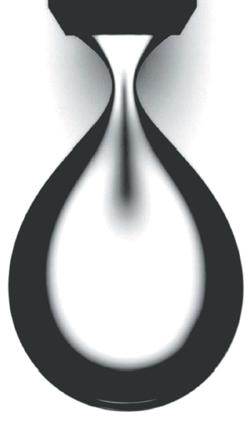|  Citations Citations
Ex and the (windy) city
Chicago residents typically spend about half of their adult lives
as singletons—a shift in coupling that has changed the institutions
through which people form relationships, according to the Chicago
Health and Social Life Survey led by Edward
O. Laumann, the George Herbert Mead distinguished service
professor in Sociology. The first representative sampling of sex
in a major urban center, the three-year study mirrors national trends,
according to Laumann. Its results will appear in The Sexual
Organization of the City, slated for release by the U of C
Press this spring.
 Courtesy
Itai Cohen and Sidney Nagel Courtesy
Itai Cohen and Sidney Nagel
|
| New drop dynamic |
What’s in a drip?
Researchers have made a splash in dynamics theory, discovering that
individual fluids divide differently. A water drop dripped through
silicone oil transforms from a smooth parabola into a microscopically
thin thread, explains a team including
Sidney Nagel, the Stein-Freiler distinguished service professor
in Physics, and Wendy Zhang,
assistant professor in Physics, in the November Science. Their findings
could pave the way for creating materials, such as filament, for
electronic, pharmaceutical, and other applications.
In the testoster-zone
For guys, spring is always in the air. Simply gabbing with a good-looking
gal sets their hormones raging, report Chicago biopsychologists
James Roney, PhD’02,
Stephen Mahler, AM’03,
and Dario Maestripieri, associate
professor in the Institute for Mind & Biology, in the November
Evolution and Human Behavior. The researchers measured testosterone
levels in 18- to 36-year-old male students’ saliva before
and after sending a young female lab assistant to chat with them.
On average the levels shot up 30 percent, a rush triggered by the
hypothalamus.
Nature over nurture
Naughty or nice? For monkeys, it’s a question of genetics.
Dario Maestripieri says in the December Developmental
Psychobiology that nonhuman primates raised by foster mothers
tend to display the aggressive or friendly mannerisms of their birth
mothers. Maestripieri’s team swapped infant rhesus macaques
among moms and then studied their interactions over a three-year
span. The results reinforce other research suggesting that human
social characteristics may be inherited.
Green gas
A father-daughter team’s discovery, published in the Proceedings
of the National Academy of Sciences, may help get hydrogen-powered
cars on the road. David and
Wendy Mao, visiting professor
and graduate student in Geophysical Sciences, have found a way to
store hydrogen—a renewable, environmentally clean resource
unlike gasoline—that demands less stringent temperatures and
pressures than existing methods. The duo have applied for a patent
on their technique, which produces a promising compound called a
hydrogen clathrate hydrate. More research is needed to synthesize
enough clathrates to run an automobile.
Fear Factor
Shyness can shorten lifespan, report Martha
McClintock, the David Lee Shillinglaw distinguished service
professor in Psychology, and psychology fellow
Sonia Cavigelli in the Proceedings of the National Academy
of Sciences. Testing rats, they found that the neophobes—those
reluctant to explore new surroundings (a bowl, an empty food receptacle,
a tunnel, and a brick in their pen were replaced with different
objects)—lived an average of three fewer months than their
adventuresome counterparts.
—M.L.
|
|
